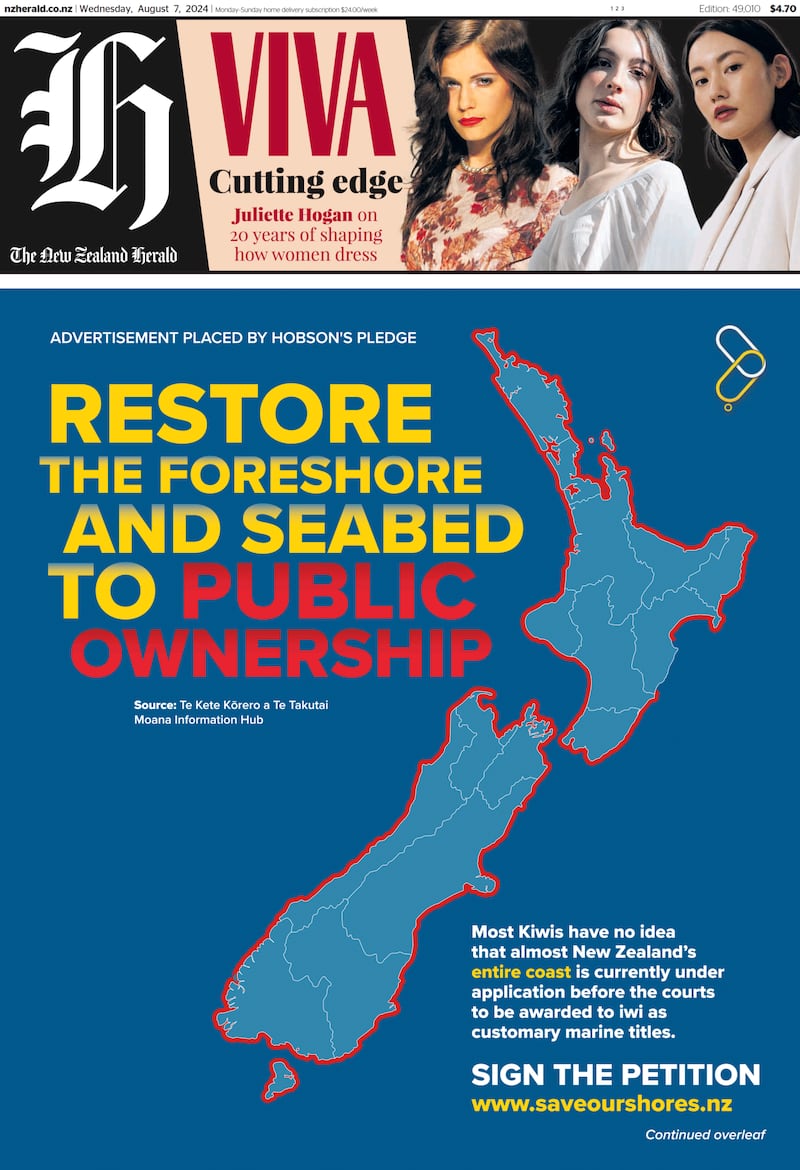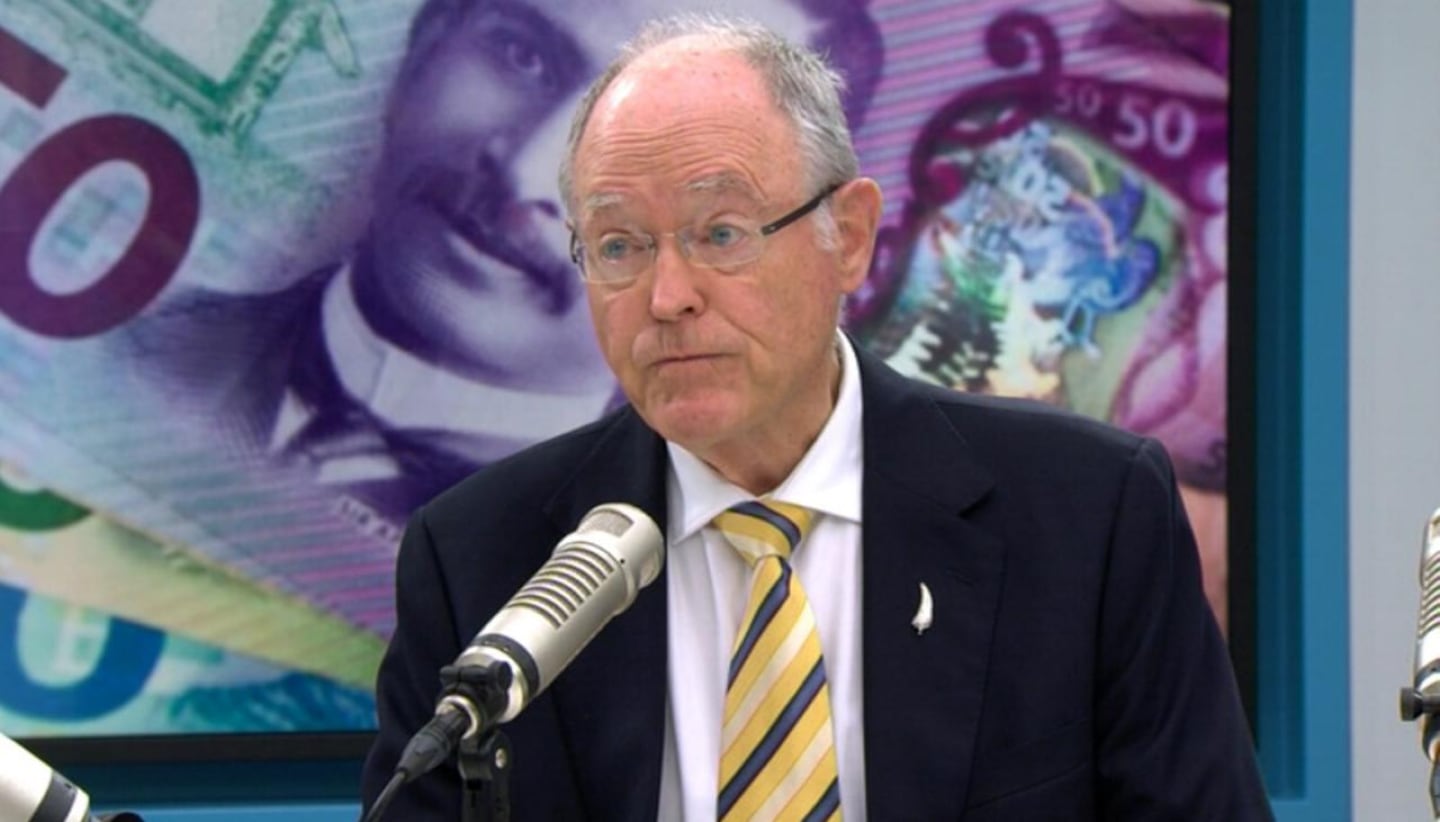Hobson’s Pledge is calling out those who claimed the ad they ran on a New Zealand Herald front page as ‘misinformation’ without any “evidence or even specifics of what exactly we have got wrong“.
“Those flinging accusations of misinformation need to front up with evidence to demonstrate what is incorrect,” Hobson’s Pledge leader Don Brash wrote in a statement.
Hobson’s Pledge said it had received death threats in its inbox over the controversial ad that was on the front page of the Wednesday, August 7 edition of the Herald, which called for the restoration of “the foreshore and seabed to public ownership”.
Brash said there was nothing “untrue” about the ad as the map used was from the Te Kete Kōrero a Te Takutai Moana Information Hub (Kōrero Takutai) on the Te Arawhiti Māori Crown Relations website, which showed areas with current High Court applications.

“Likewise, our information on the rights that come with customary marine titles was sourced from the Te Arawhiti Māori Crown Relations website.
“The level of rage the ad generated speaks to the degree to which radicals have whipped their supporters into a frenzy. It is concerning and appears to be escalating.
“Hobson’s Pledge has repeated that we abhor political violence and that all of our activism and advocacy is utterly non-violent. Judging by the messages we have received in the past few days, our opponents do not take the same position.
“Our opponents appear not to be angry because we said anything false but because we printed truthful information that they do not want to be widely understood.
“Whatever one’s position on customary rights to the foreshore and seabed, New Zealanders having access to more information about it should not be a negative. The information is already there on a government website. We are simply drawing attention to it.”
In the statement Brash also took a swing at Te Pāti Māori, which last week spoke out about it, calling the ad “anti-māori propaganda”.
“Te Pāti Māori should be condemned for attempting to strong-arm the media into not publishing advertisements that they disagree with. They are interfering in commercial relationships. The kind of power they are demanding is intoxicating and will not stop here. Once they know they can bully the media they will use the same tactics on other issues and other advertisers.
“It starts to look like cartel behaviour when activists coordinate to bully businesses which publish information that they don’t want shared.
“I repeat, the information on our ad was factual and sourced from a government website. We said that we don’t agree with the status quo. If discussing legislation and its implications is now beyond the pale and generates such visceral anger we are in big trouble.
“Healthy democracies do not accept suppression of political discussion and dissent. Te Pāti Māori and its proxies are welcome to share their alternative perspective, but they aren’t entitled to bully and silence their opponents,” Brash said.
‘Iwi vs Kiwi’
But Te Pāti Māori is standing its ground to argue the ad was “misleading and misinformative propaganda designed to sow resentment against Māori“.
“This is stock standard Don Brash and his book of tricks taking us back to Iwi vs Kiwi.
“The advertisement insinuates that Māori will take full ownership of the foreshore and seabed. Customary marine title does not equal ownership and so, not only is the advert misinformation, it is also contradictory.
“Hobson’s Pledge sees Māori and iwi as a barrier to the assault they want to enable through seabed mining and destructive environmental practice,” the party spokesperson told Te Ao Māori News.
The spokesperson said customary marine title allowed decisionmaking when it came to the use of the foreshore and seabed. This could be from iwi and those with an application before the High Court.
“It is very conniving messaging that is paraded on the many complexities and technicalities in legislation, interpretation and the use of language. Reading such advertisements with such headlines and without context is the harmful tactics this lot play.
“We have filed our complaint with the Advertising Standards Authority and, in our view, six rules have been breached. We are looking forward to the ASA conducting its investigation and their response.”



